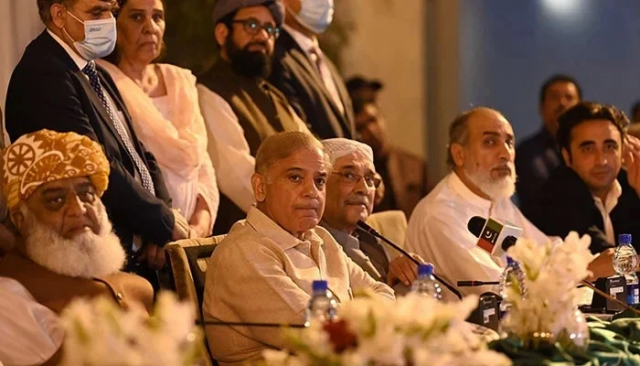PDM dilemma: losing IMF or polls
Despite efforts, prospects of securing remaining loan of $2.6b very bleak

The famous playbook used by governments so far in Pakistan to deal with the IMF offers no solution to the clueless PDM government dealing with a unique scenario due to the unusual turn of events triggered by the successful vote of no-confidence motion against any sitting government in the political history of Pakistan.
The political crisis has broken the usual “IMF cycle” where a new government usually takes tough decisions in the first few years under the loan programme to stabilise the economy before succumbing to the temptation of loose fiscal control at the end to win elections.
After years of corruption, mismanagement, and growing mistrust and fatigue among lenders, Pakistan has reached the point where even securing an IMF deal is no longer in our own control and needs firm backing and commitment from friendly countries whose patience must have some limits.
Despite all the endeavours on the diplomatic front including the last-ditch effort by Prime Minister Shehbaz Sharif to convince IMF Managing Director Kristalina Georgieva, the prospect of securing the remaining tranches of $2.6 billion is very bleak.
At the time of writing this article, Pakistan was still short of $2 billion out of the total arrangement of $6 billion sought by the IMF.
Even at this critical juncture where absolute clarity is a must, we often get more confused when we listen to the stark warning issued by various prominent economists including former finance minister Dr Miftah Ismail, as opposed to the assurance from Ishaq Dar that we can survive sans the IMF deal.
With the deadline of June 30 for finalising the ninth review with the IMF approaching faster, there seems to be business as usual on the political front with no sense of urgency and focus.
Recently, spokespersons for the PDM government tried to flaunt the current account surplus of $654 million in March as a turnaround story after many months of deficit. Even Dar came to Twitter to unveil the figures himself and the Q-block even went ahead and tried to sell it to the IMF to persuade it to soften its conditions but to no avail.
It is very obvious that the way we achieved the surplus was by totally choking the economy by curbing imports is not sustainable and the recent current account deficit in May exposed the reality.
How long can we bend the inelastic demand without breaking something in the economy? To answer this question, we can take cue from the recent experiment to artificially hold the dollar-rupee parity and the disastrous effect it had on the economy.
Although long-term policy direction such as broadening the tax base should be a critical element of the upcoming budget, considering the temporary nature of the current political setup, they will only try to kick the can down the road probably as far as August.
This will put the caretaker setup in a tight situation and with the limited mandate of just conducting elections, they will not be able to manoeuvre through the turbulent economic landscape.
This is the reason why many economic or even political analysts are asking for early elections to quickly end the uncertainty looming large for more than a year now with two provinces practically without any government.
So far, the PDM government has taken many tough decisions necessary to secure the IMF deal and has even shared budget outlay with the lender for its nod. However, they may still be tempted to use this budget as their last chance to do some damage control.
Considering the tough stance of the IMF, any concession can be ruled out. In fact, it is interesting to see the revenue collection target for the next fiscal year when the economy is expected to grow only slightly, although Dr Hafiz Pasha disagrees and predicts a GDP contraction by at least 3%.
This is the dilemma that may allow PDM to give an election-friendly budget to salvage their political capital. On the other hand, the survival of Pakistan is tied not only to completing the IMF’s ninth review successfully but also negotiating the 10th and 11th reviews in order to secure the mammoth financing of $25 billion for the upcoming financial year.
The writer is a financial market enthusiast and is attached to Pakistan’s stocks, commodities and emerging technology
Published in The Express Tribune, June 5th, 2023.
Like Business on Facebook, follow @TribuneBiz on Twitter to stay informed and join in the conversation.


















COMMENTS
Comments are moderated and generally will be posted if they are on-topic and not abusive.
For more information, please see our Comments FAQ